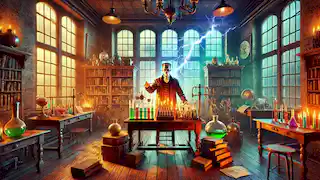Chapter 1: A Dark and Stormy Night
It was on a dreary night of November that I beheld the accomplishment of my toils. With an anxiety that almost amounted to agony, I collected the instruments of life around me, that I might infuse a spark of being into the lifeless thing that lay at my feet. It was already one in the morning; the rain pattered dismally against the panes, and my candle was nearly burnt out, when, by the glimmer of the half-extinguished light, I saw the dull yellow eye of the creature open; it breathed hard, and a convulsive motion agitated its limbs.
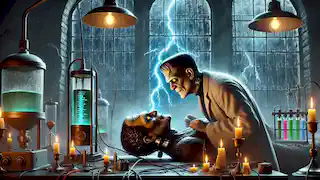
How can I describe my emotions at this catastrophe, or how delineate the wretch whom with such infinite pains and care I had endeavored to form? His limbs were in proportion, and I had selected his features as beautiful. Beautiful!—Great God! His yellow skin scarcely covered the work of muscles and arteries beneath; his hair was of a lustrous black, and flowing; his teeth of a pearly whiteness; but these luxuriances only formed a more horrid contrast with his watery eyes, that seemed almost of the same color as the dun white sockets in which they were set, his shriveled complexion and straight black lips.
The different accidents of life are not so changeable as the feelings of human nature. I had worked hard for nearly two years, for the sole purpose of infusing life into an inanimate body. For this I had deprived myself of rest and health. I had desired it with an ardour that far exceeded moderation; but now that I had finished, the beauty of the dream vanished, and breathless horror and disgust filled my heart. Unable to endure the aspect of the being I had created, I rushed out of the room, and continued a long time traversing my bedchamber, unable to compose my mind to sleep. At length lassitude succeeded to the tumult I had before endured; and I threw myself on the bed in my clothes, endeavouring to seek a few moments of forgetfulness. But it was in vain: I slept indeed, but I was disturbed by the wildest dreams. I thought I saw Elizabeth, in the bloom of health, walking in the streets of Ingolstadt. Delighted and surprised, I embraced her; but as I imprinted the first kiss on her lips, they became livid with the hue of death; her features appeared to change, and I thought that I held the corpse of my dead mother in my arms; a shroud enveloped her form, and I saw the grave-worms crawling in the folds of the flannel. I started from my sleep with horror; a cold dew covered my forehead, my teeth chattered, and every limb became convulsed: when, by the dim and yellow light of the moon, as it forced its way through the window shutters, I beheld the wretch—the miserable monster whom I had created. He held up the curtain of the bed; and his eyes, if eyes they may be called, were fixed on me. His jaws opened, and he muttered some inarticulate sounds, while a grin wrinkled his cheeks. He might have spoken, but I did not hear; one hand was stretched out, seemingly to detain me, but I escaped, and rushed down stairs. I took refuge in the courtyard belonging to the house which I inhabited; where I remained during the rest of the night, walking up and down in the greatest agitation, listening attentively, catching and fearing each sound as if it were to announce the approach of the demoniacal corpse to which I had so miserably given life.
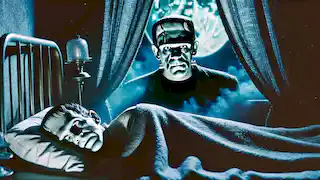
Oh! No mortal could support the horror of that countenance. A mummy again endued with animation could not be so hideous as that wretch. I had gazed on him while unfinished; he was ugly then; but when those muscles and joints were rendered capable of motion, it became a thing such as even Dante could not have conceived.
I passed the night wretchedly. Sometimes my pulse beat so quickly and hardly, that I felt the palpitation of every artery; at others, I nearly sank to the ground through languor and extreme weakness. Mingled with this horror, I felt the bitterness of disappointment; dreams that had been my food and pleasant rest for so long a space, were now become a hell to me; and the change was so rapid, the overthrow so complete!
Chapter 2: The Flight
Morning, dismal and wet, at length dawned, and discovered to my sleepless and aching eyes the church of Ingolstadt, its white steeple and clock, which indicated the sixth hour. The porter opened the gates of the court, which had that night been my asylum, and I issued into the streets, pacing them with quick steps, as if I sought to avoid the wretch whom I feared every turning of the street would present to my view. I did not dare return to the apartment which I inhabited, but felt impelled to hurry on, although drenched by the rain which poured from a black and comfortless sky.
I continued walking in this manner for some time, endeavoring by bodily exercise to ease the load that weighed upon my mind. I traversed the streets, without any clear conception of where I was, or what I was doing. My heart palpitated in the sickness of fear; and I hurried on with irregular steps, not daring to look about me:
Like one who, on a lonely road,
Doth walk in fear and dread,
And, having once turned round, walks on,
And turns no more his head;
Because he knows a frightful fiend
Doth close behind him tread.
Continuing thus, I came at length opposite to the inn at which the various diligences and carriages usually stopped. Here I paused, I knew not why; but I remained some minutes with my eyes fixed on a coach that was coming towards me from the other end of the street. As it drew nearer, I observed that it was the Swiss diligence; it stopped just where I was standing, and on the door being opened, I perceived Henry Clerval, who, on seeing me, instantly sprung out. “My dear Frankenstein,” exclaimed he, “how glad I am to see you! How fortunate that you should be here at the very moment of my alighting!”
Nothing could equal my delight on seeing Clerval; his presence brought back to my thoughts my father, Elizabeth, and all those scenes of home so dear to my recollection. I grasped his hand, and in a moment forgot my horror and misfortune; I felt suddenly, and for the first time during many months, calm and serene joy. I welcomed my friend, therefore, in the most cordial manner, and we walked towards my college. Clerval continued talking for some time about our mutual friends, and his own good fortune in being permitted to come to Ingolstadt. “You may easily believe,” said he, “how great was the difficulty to persuade my father that it was not absolutely necessary for a merchant not to understand anything except book-keeping; and, indeed, I believe I left him incredulous to the last, for his constant answer to my unwearied entreaties was the same as that of the Dutch schoolmaster in The Vicar of Wakefield: ‘I have ten thousand florins a year without Greek, I eat heartily without Greek.’ But his affection for me at length overcame his dislike of learning, and he has permitted me to undertake a voyage of discovery to the land of knowledge.”
“I am happy,” said Frankenstein, “to have gained a disciple; and if your application equals your ability, I have no doubt of your success. When I was at the height of my fervour, I would willingly have submitted to the absence of wealth; I have even now to endure poverty, but I have no doubt that I shall satisfy my ardent curiosity in visiting the world, and have ample means to obtain my objects of research. But wherefore delay our proceedings? This is a moment of triumph. One day more, and I shall be enabled to recompense all my toils and services, and visit you with my completed project.”
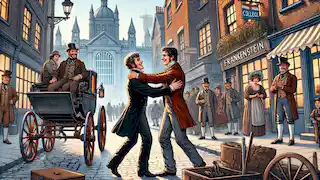
The recollection of what I had endured, and the excellent being I had created, is sufficient to support me, and will be an inexhaustible source of consolation and happiness. But I must pause here; my own recollections have at this moment taken such a hold of my mind, that I shall write them down. But I cannot forbear recording the extraordinary vicissitudes that have marked my progress, and must be considered as episodic to my tale, but which will afford a view of my course from the first entrance on this mode of life to my present state.
Chapter 3: The Monster’s First Steps
Six years had elapsed, passed in a dream but for one indelible trace, and I stood in the same place where I had last embraced my father before my departure for Ingolstadt. Beloved and venerable parent! I remained for several minutes motionless with my eyes fixed on the ground. Through the whole of this wretched mockery of justice I suffered living torture. A thousand times I would have confessed myself guilty of the crime ascribed to Justine, but I was absent when it was committed, and such a declaration would have been considered as the ravings of a madman and would not have exculpated her who suffered through me. The appearance of Justine was calm. She was dressed in mourning, and her countenance, always engaging, was rendered, by the solemnity of her feelings, exquisitely beautiful. Yet she appeared confident in innocence and did not tremble, although gazed on and execrated by thousands; for all the kindness which her beauty
might otherwise have excited was obliterated in the minds of the spectators by the imagination of the enormity she was supposed to have committed. She was tranquil, yet her tranquillity was evidently constrained; and as her confusion had before been adduced as a proof of her guilt, she worked up her mind to an appearance of courage. When she entered the court she threw her eyes round it and quickly discovered where we were seated. A tear seemed to dim her eye when she saw us, but she quickly recovered herself, and a look of sorrowful affection seemed to attest her utter guiltlessness.
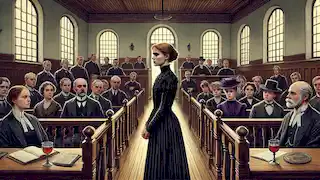
The trial began, and after the advocate against her had stated the charge, several witnesses were called. Several strange facts combined against her, which might have staggered any one who had not such proof of her innocence as I had. She had been out the whole of the night on which the murder had been committed, and towards morning had been perceived by a market-woman not far from the spot where the body of the murdered child had been afterwards found. The woman asked her what she did there, but she looked very strangely and only returned a confused and unintelligible answer. She returned to the house about eight o’clock, and when one inquired where she had passed the night, she replied that she had been looking for the child and demanded earnestly if anything had been heard concerning him. When shown the body, she fell into violent hysterics and kept her bed for several days. The picture was then produced which the servant had found in her pocket; and when Elizabeth, in a faltering voice, proved that it was the same which, an hour before the child had been missed, she had placed round his neck, a murmur of horror and indignation filled the court.
Chapter 4: The Monster's Lament
Frankenstein, his heart heavy with guilt and grief, wandered aimlessly through the dense forests, seeking solace in the isolation of nature. As he ventured deeper into the woods, he heard a rustling in the underbrush. To his horror, the creature he had brought to life emerged from the shadows.
"Why do you torment me so?" the monster pleaded. "I have endured nothing but pain and rejection since the moment I opened my eyes. I am your creation, and yet you despise me."
Frankenstein recoiled, torn between his revulsion and the faint glimmer of compassion he felt. "I did not foresee the misery my work would cause. What do you want from me?"
"I want only what you promised," the monster replied, "companionship, acceptance, a chance to live without fear. You, who made me, must create another like me, to share in my suffering and to ease my loneliness."
Frankenstein was filled with dread at the prospect of creating another being like the first, but he could not ignore the desperation in the creature's voice. "I cannot make such a promise lightly. Give me time to consider your request."
The monster agreed, but his eyes burned with a fervent hope that Frankenstein's decision would bring him the peace he so desperately sought.
Chapter 5: A Horrifying Realization
Weeks passed, and Frankenstein toiled day and night, wrestling with his conscience and the implications of creating another monster. The weight of his responsibility pressed heavily upon him, but he knew he could not ignore the plea of his tormented creation.
In a secluded laboratory far from prying eyes, Frankenstein began the dreadful work once more. He gathered the necessary materials and instruments, and with a heavy heart, he started the process of bringing another creature to life.
As he worked, he was haunted by the memory of the first monster's anguished expression and the thought of unleashing yet another horror upon the world. His mind was plagued by doubts, but he pressed on, driven by a sense of duty and a glimmer of hope that this new being might bring some measure of peace.
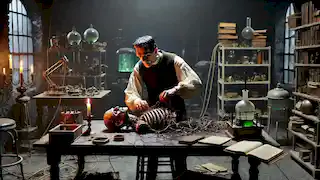
When the moment finally arrived, Frankenstein hesitated, his hand trembling as he prepared to infuse life into the lifeless form before him. But before he could complete the process, a sudden realization struck him: creating another monster would not solve the problem but only compound the misery.
With a cry of anguish, Frankenstein destroyed his work, vowing never to repeat his mistake. He knew that his creation would not forgive him, but he hoped that in time, the monster would find a way to live in peace.
Chapter 6: The Final Confrontation
The monster, enraged by Frankenstein's decision, sought him out, determined to exact revenge for the broken promise. Their final confrontation took place on a desolate, icy landscape, where the harsh elements mirrored the cold fury in the monster's heart.
"You have betrayed me!" the monster bellowed. "You gave me hope and then dashed it to pieces. For that, you will pay with your life."
Frankenstein, weary and broken, faced his creation with a mixture of fear and resignation. "I cannot undo what I have done, but I will not create another abomination. I accept whatever fate you choose for me."
The monster lunged at Frankenstein, their struggle fierce and desperate. The ice beneath them cracked and groaned, threatening to give way. In their final moments, Frankenstein's thoughts turned to his loved ones and the havoc his ambition had wrought.
As the ice shattered, both creator and creation plunged into the freezing depths, their fates forever entwined. The monster's last words echoed in Frankenstein's mind: "I am not a demon, but a wretch, abandoned and alone."
Epilogue: The Legacy of Frankenstein
News of Frankenstein's tragic end spread quickly, and his tale became a cautionary legend, a stark reminder of the dangers of unchecked ambition and the ethical responsibilities of scientific exploration.
Those who knew Frankenstein mourned his loss, but they also remembered the lessons he had imparted. They vowed to approach their own endeavors with humility and a deep respect for the potential consequences of their actions.
And so, the story of Frankenstein and his monstrous creation lived on, a timeless warning of the perils of playing god and the enduring quest for understanding and redemption.
